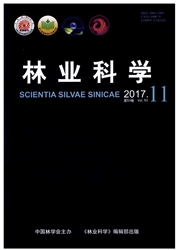

 中文摘要:
中文摘要:
在自然界,水通常是限制植物生长的重要因子。水分亏缺严重影响着植物的形态结构、光合生长和代谢水平(Seki et al.,2007),但植物也进化出了复杂的感知、响应和适应水分亏缺的机制。
 英文摘要:
英文摘要:
A pot experiment in the outdoor was conducted to investigate the effect of soil progressive drought on the physiological parameters of 2-year-old Populus euphratica seedlings in the lower reach of Tarim River. The seedlings were respectively grown under well-watered and progressive water deficit conditions by controlling the water supply. Chlorophyll fluorescence parameters of actual photochemical quantum yield of PSII in the light (tpps~1) , photochemical quenching index (qp) and non-photochemical quenching index (qN) , leaf stomatal conductance ( G ) and predawn water potential were measured during the experiment period. Results showed that the soil moisture content decreased to mild drought stress level in 6 days after a saturated irrigation, and reached to severe drought stress level in 15 days after a saturated irrigation in July. During the drying process of soil water content, the increasing soil drought resulted in decreases in the predawn leaf water potential at 6:00 am, φPSH,, qp and G of the seedlings, but increase in qN. These results would provide a scientific foundation for understanding drought resistant mechanism of P. euphratica seedlings.
 同期刊论文项目
同期刊论文项目
 同项目期刊论文
同项目期刊论文
 Simulation of the effect of root distribution on hydraulic redistribution in a desert riparian fores
Simulation of the effect of root distribution on hydraulic redistribution in a desert riparian fores Analysis of dominant factors influencing moisture change of broad-ovate leaves of Populus euphratica
Analysis of dominant factors influencing moisture change of broad-ovate leaves of Populus euphratica The threshold of soil moisture and salinity influencing the growth of Populus euphratica and Tamarix
The threshold of soil moisture and salinity influencing the growth of Populus euphratica and Tamarix Xylem hydraulic conductivity and embolism in riparian plants and their responses to drought stress i
Xylem hydraulic conductivity and embolism in riparian plants and their responses to drought stress i Photosynthetic performance of two poplar species in shelterbelt under water-saving irrigation in ari
Photosynthetic performance of two poplar species in shelterbelt under water-saving irrigation in ari Hydraulic redistribution of soil water in Populus euphratica Oliv. in a central Asian desert riparia
Hydraulic redistribution of soil water in Populus euphratica Oliv. in a central Asian desert riparia The effects of oasis ecosystem hydrological processes on soil salinization in the lower reaches of t
The effects of oasis ecosystem hydrological processes on soil salinization in the lower reaches of t Progress, challenges and prospects of eco-hydrological studies in the Tarim River Basin of Xinjiang,
Progress, challenges and prospects of eco-hydrological studies in the Tarim River Basin of Xinjiang, Dew formation and its long-term trend in a desert riparian forest ecosystem on the eastern edge of t
Dew formation and its long-term trend in a desert riparian forest ecosystem on the eastern edge of t Water use strategies of the desert riparian forest plant community in the lower reaches of Heihe Riv
Water use strategies of the desert riparian forest plant community in the lower reaches of Heihe Riv Sap flow characteristics of four typical species in desert shelter forest and their responses to env
Sap flow characteristics of four typical species in desert shelter forest and their responses to env Sap flow and trunk maximum daily shrinkage (MDS) measurements for diagnosing water status of Populus
Sap flow and trunk maximum daily shrinkage (MDS) measurements for diagnosing water status of Populus 期刊信息
期刊信息
